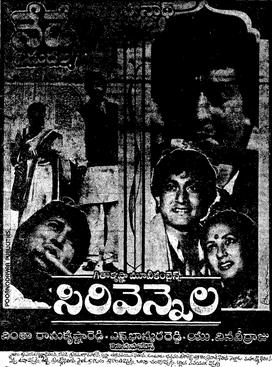Top Qs
Timeline
Chat
Perspective
Sirivennela
1986 Indian film From Wikipedia, the free encyclopedia
Remove ads
Sirivennela[a] (Telugu :సిరివెన్నల) (transl. Moonlight) is a 1986 Indian Telugu-language romance film written and directed by K. Viswanath. The film stars Suhasini, Sarvadaman Banerjee and Moon Moon Sen. The film has music composed by K. V. Mahadevan.
The film won five Nandi Awards.[2] The film was screened at the Asia Pacific Film Festival, the International Film Festival of India, the Moscow Film Festival and the AISFM Film Festival.[3][4] The film was shot in Jaipur and Kerala. The film has Hariprasad Chaurasia's flute rendering and a cameo of drummer Sivamani.[5] The film was dubbed in Tamil as Raaga Devathai.[6] Lyricist Seetharama Sastry derived his stage name Sirivennela from this film.
Remove ads
Plot
Summarize
Perspective
Hari Prasad (Sarvadaman Banerjee), a blind flutist lives along with his younger sister Samyuktha "Samyu", in a village near Jaipur, which is also a tourist attraction. Though he lacks knowledge of classical music, he plays the flute melodiously. He makes a living by playing it for the tourists. One day, guide Jyothirmai (Moon Moon Sen) comes along with a bunch of tourists and listens to his flute. She understands his talent and helps him understand nature and to become a famous flautist. Years pass and Hari Prasad becomes Pandit Hari Prasad. Unknown to Jyothirmai, Hari Prasad admires her very much and dedicates all his albums to her. Meanwhile, a mute painter Subhashini (Suhasini) meets him in his village and falls for him.
Subhashini expresses her feelings through her paintings and gradually her brother understands her feelings for Hari Prasad. He approaches Hari Prasad's uncle with a marriage proposal. But at the same time Hari Prasad reveals his admiration for Jyothirmai. This shocks Jyothirmai as she previously worked as an escort to rich tourists. She tries to hint to Hari Prasad about her not so decent past, but is overwhelmed by his pure love and his disregard for her past. Though she admires him, she feels that she would taint him with her past. She tells Hari Prasad that she cannot marry him as she already is engaged to a doctor. Hari Prasad takes it well as he always wanted Jyothirmai to be happy, and arranges her wedding.
On the wedding day, Jyothirmai commits suicide and requests in her last note that her eyes should be donated to Hari Prasad. She also requests that her funeral procession should appear like a marriage procession, and that her death should be hidden from Hari Prasad. Everyone acts like they are sending her to her in-laws. Hari Prasad keeps calm through all of this, and at last goes to the graveyard to say his final goodbye to Jyothirmai. He tells shocked Samyu that it is impossible to hide her death from him. The film ends with Hari Prasad and Subhashini mourning silently in the graveyard.
Remove ads
Cast
- Suhasini as Subhashini
- Sarvadaman Banerjee as Pandit Hari Prasad
- Moon Moon Sen as Jyotirmayi
- Nithya as Samyuktha, Hari's sister
- J. V. Ramana Murthi as Recording Company Owner
- S. K. Misro as Ramalingaiah, village elder and grandfather figure
- Shubha
- Sakshi Ranga Rao as Music Teacher
- Subhalekha Sudhakar as Tour Guide Sooribabu
- G. Varalakshmi
- Eashwara Rao
- Samyuktha
- Jit Mohan Mitra
- Baby Meena as Renu
- Madhurima Narla
- Sivamani is a cameo drummer
Remove ads
Soundtrack
Sirivennela abounds in classical music composed by K. V. Mahadevan with flute renditions by the renowned flautist Hariprasad Chaurasia.[7] All songs were written by Seetharama Sastry. After the success of the soundtrack, he became popularly known as "Sirivennela" Seetharama Sastry. The music was released through Lahari music label.[1]
Awards
Notes
- Spelt as Siri Vennela on the CBFC certificate.
References
External links
Wikiwand - on
Seamless Wikipedia browsing. On steroids.
Remove ads

